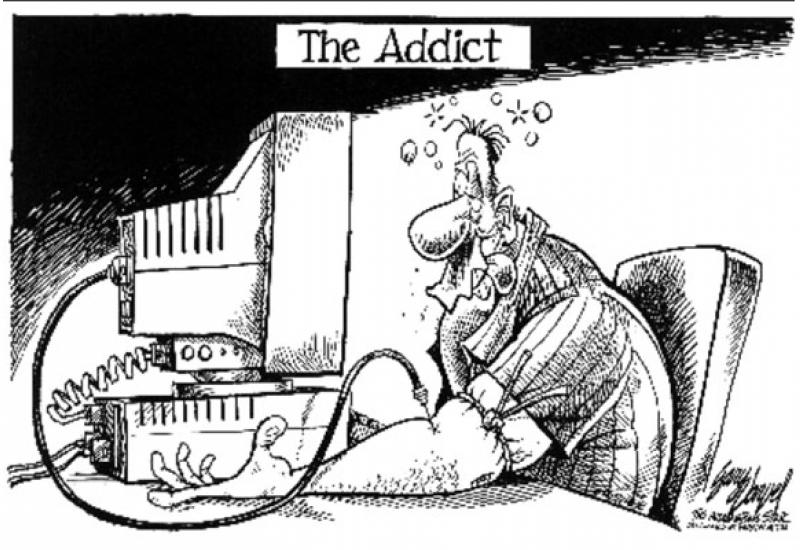Internet addiction is one of the species of dependent behavior, along with alcohol, drug addiction, gambling games and etc. Unlike alcohol and drug addiction, Internet addiction entirely contained in mental health (physiological dependence is not formed). However, we should not assume that this form of addiction is less serious.
Internet addiction manifests itself in space communication. This lack of freedom in communication is a key issue for this form of addiction. The lack of communicative competence encourages young people to communicate directly instead of modern technical tools that reduce the emotional side of communication, business communication alienates one another, make them anonymous, deprived of communication intimacy.
Internet addiction has social reasons therefore it makes no sense to convince Internet-dependent adolescents or young people in their stupidity obsessive symptoms. This absurdity can be quite visible to them - and then impossible termination intensive Internet communication leads to lowering their self-esteem, loss of self-esteem. The immediate social base of Internet addiction codependency in relationships acting parent families.
Internet gives the illusion of a teenager fleeing from codependent relationship inherent in parental family, but he is a teenager with an online communication that still deprived of their autonomy model. Student age in our modern culture provides the opportunity for the individual "stand on its own feet", but at the same time largely allows students to "sit on shiyi" parents do not solve serious life issues. This dependence is triggered by parents and students is used in the context of co-dependence.
The main symptoms of codependency are: feeling of dependence on people; stay feeling trapped controlling relationships degrading you; low self-esteem; the need for constant approval and support from others to feel that you are going well; feeling of inability to change anything in destructive relationships; the need for alcohol, Internet communication, work, sex or any other external stimulants to distract from their experiences; psychological uncertainty limits; feeling yourself as a martyr; feeling yourself as a clown; inability to experience the true feeling of closeness and love.
If you look closely on the main characteristics of codependent osobystos those you'll find the typical pattern of behavior, a characteristic of child two or three years than for an adult.
If you are addicted, you:
- unable to distinguish your thoughts and feelings from thoughts and feelings of others (you think and respond for other people);
- look for attention and approval of others to feel good;
- feel anxiety or guilt when others have "problems";
- believe that others know better than you what is best for you;
- Get annoyed or discouraged when things do not go as you would like;
- trying to prove to others that you are good enough to love you;
- do not believe that you can take care of yourself;
- believe that anyone can be trusted;
- idealize others and get disappointed when they do not live the way you hoped;
- whine to get what you wanted;
- feel that others have appreciated and not overlooked;
- think you are not good enough;
- live as you like - a victim of circumstances;
- afraid of making a mistake;
- afraid of expressing their true feelings for fear of rejection;
- let others hurt you, do not try to protect yourself;
- do not trust yourself and do not accept your decisions;
- experience problems while being alone with yourself;
- afraid of making a mistake;
- afraid of your own anger;
- feel unable to change your position or obtain modifications in yourself;
- think that someone has to change, to change yourself.
Means of personal recovery from codependency can be described as follows:
Assume that there is a problem you can not solve with resources and information available to you for today. To study the real causes of your problem. Learn to identify the symptoms of the problem according to the actual situation in your relationship. Stop to shift the blame for your problems on others. Stop blame yourself for your mistakes and imperfections. Stop resort to manipulation to get what you want. Be prepared to ask for what you want. Learn to feel the fullness of their feelings and express all your feelings. Implement steps to a better understanding of their inner feelings, values, needs, desires. To determine their psychological boundaries in relationships with other people. Learn to be close to other people, to get them the information, learn to live in balance flexible relationship your true "I" with others.
And use the Internet as a technical means of communication - is not in itself harmful. If a youth becomes dependent on Internet - not online right.
By O.A.Breusenko-Kuznetsov, assistant professor of psychology and pedagogy "KPI"

